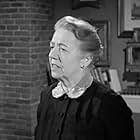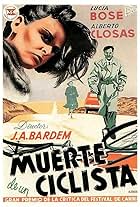An ill-advised charity campaign encouraging wealthy citizens to break bread with the less fortunate sweeps across a small industrial Spanish town on Christmas Eve.An ill-advised charity campaign encouraging wealthy citizens to break bread with the less fortunate sweeps across a small industrial Spanish town on Christmas Eve.An ill-advised charity campaign encouraging wealthy citizens to break bread with the less fortunate sweeps across a small industrial Spanish town on Christmas Eve.
- Nominated for 1 Oscar
- 7 wins & 2 nominations total
Cassen
- Plácido Alonso
- (as Casto Sendra 'Cassen')
José María Caffarel
- Zapater
- (as José Mª Caffarel)
Gloria Osuna
- Lali
- (as Gloria F. Osuna)
Featured reviews
The atmosphere of this film took me back to another time and place, to a very naive and innocent Spain. This film is Garcia Berlanga's incursion into his own brand of neorealism. The music keeps evoking the scores of the great Italian masterpieces of that period.
Placido, the hero, in a way, is everyman caught in a web of bureaucracy where he has to fight against all the odds to keep his vehicle in order to survive. He does whatever he can in order to pay the draft, but all conspires against him. Placido is a decent working person, a man of honor who has to fulfill his obligations, in this case, paying the draft that is due on the day the story unfolds. Everything is against him. We see him fighting his way to do so, in this, his long journey into the Christmas Eve celebration.
Cassen was a marvelous and charismatic actor who was very convincing as Placido. He's always at the center of the action, and at times, he is even at the center of some of the other characters conflicts. Jose Luis Lopez Vazquez, is very effective as Gabino, the photographer. The rest of the ensemble cast perform very well under the direction of Garcia Berlanga.
The film is a lot of fun.
Placido, the hero, in a way, is everyman caught in a web of bureaucracy where he has to fight against all the odds to keep his vehicle in order to survive. He does whatever he can in order to pay the draft, but all conspires against him. Placido is a decent working person, a man of honor who has to fulfill his obligations, in this case, paying the draft that is due on the day the story unfolds. Everything is against him. We see him fighting his way to do so, in this, his long journey into the Christmas Eve celebration.
Cassen was a marvelous and charismatic actor who was very convincing as Placido. He's always at the center of the action, and at times, he is even at the center of some of the other characters conflicts. Jose Luis Lopez Vazquez, is very effective as Gabino, the photographer. The rest of the ensemble cast perform very well under the direction of Garcia Berlanga.
The film is a lot of fun.
I have seen hundreds of placidos in real life,I'm 37 and I was born in south spain, this movie is a fresco very close to the truth, a wonder in every aspect, placido takes the central role, the gravitational axis, everyone is a cinic in this film, except placido, this trick makes everything works as berlanga wants increasing the effect of desolation. Tragicomical in the same way that chaplin and rossellini.
Venerable Spanish director Luis García Berlanga's hyperbolically frenetic social satire PLACIDO is an Oscar nominee for BEST FOREIGN LANGUAGE FILM and Palme d'or contestant, and guilefully circumvents the censor of Franco's government by subsuming his trenchant sideswipes into the pandemonium of a farcical dynamo.
The story takes place exclusively on the day before Christmas, in a small Spanish town, to celebrate the festival, each of the wealthy families will invite one poor citizen to each one's Christmas Eve dinner, to be a Good Samaritan for one day, (but even that, would be too big a challenge for many of them, Berlanga makes sure that the acerbic irony doesn't lose itself in the swamp of shameless plugging) . And Placido (comedian Cassen in his film debut) is an unassuming man who must pay his bill before midnight, otherwise he will lose his motor-vehicle (and his family stays in the public lavatory because they cannot afford the rent). He is hired by Gabino Quintanilla (Vázquez, a masterful nexus in the convoluted morass), the photographer of the so-called "set a poor man at your table" charity event, to participate the Christmas parade in the afternoon with his vehicle, after he picks up a band of film stars in the train stations, who will participate in the charity auction afterwards.
Rambunctious from A to Z, this comedy distinguishes itself as an interminably garrulous talkie, which sets a built-in hindrance to those subtitle-dependent first-time viewers, it could be an excruciatingly daunting experience since the devil is in the details, and it is plain physically impossible to get on board with all comings and goings at that speed. The charity plugging continues with an effervescent flurry of episodes where bourgeois hypocrisy, nagging nuisances, contemptible unkindness inexorably career through the night with Placido persistently tailing behind to make both ends meet.
A plethora of named Spanish actors appears on the roster to enliven the burlesque merry-go- round, which predominantly caters for its home-turf demography who can trace a piquant whiff of self-referentiality out of its rowdy mockery, and also accentuates Berlanga's rhythmic legerdemain to affix a catenation of skits scene to scene in a non-stop fashion, however, in the eyes of an outsider, its efficacy is potently eclipsed by his tangibly more mordant social critique THE EXECUTIONER (1963).
The story takes place exclusively on the day before Christmas, in a small Spanish town, to celebrate the festival, each of the wealthy families will invite one poor citizen to each one's Christmas Eve dinner, to be a Good Samaritan for one day, (but even that, would be too big a challenge for many of them, Berlanga makes sure that the acerbic irony doesn't lose itself in the swamp of shameless plugging) . And Placido (comedian Cassen in his film debut) is an unassuming man who must pay his bill before midnight, otherwise he will lose his motor-vehicle (and his family stays in the public lavatory because they cannot afford the rent). He is hired by Gabino Quintanilla (Vázquez, a masterful nexus in the convoluted morass), the photographer of the so-called "set a poor man at your table" charity event, to participate the Christmas parade in the afternoon with his vehicle, after he picks up a band of film stars in the train stations, who will participate in the charity auction afterwards.
Rambunctious from A to Z, this comedy distinguishes itself as an interminably garrulous talkie, which sets a built-in hindrance to those subtitle-dependent first-time viewers, it could be an excruciatingly daunting experience since the devil is in the details, and it is plain physically impossible to get on board with all comings and goings at that speed. The charity plugging continues with an effervescent flurry of episodes where bourgeois hypocrisy, nagging nuisances, contemptible unkindness inexorably career through the night with Placido persistently tailing behind to make both ends meet.
A plethora of named Spanish actors appears on the roster to enliven the burlesque merry-go- round, which predominantly caters for its home-turf demography who can trace a piquant whiff of self-referentiality out of its rowdy mockery, and also accentuates Berlanga's rhythmic legerdemain to affix a catenation of skits scene to scene in a non-stop fashion, however, in the eyes of an outsider, its efficacy is potently eclipsed by his tangibly more mordant social critique THE EXECUTIONER (1963).
This was the fifth Berlanga outing I have checked out after CALABUCH (1956), the compendium THREE FABLES OF LOVE (1962), his masterpiece NOT ON YOUR LIFE (1963) and LIFE SIZE (1974; which I only watched in a trimmed version) – however, I also own WELCOME, MR. MARSHALL! in my collection.
The film under review is a satire about a small-town's attempt to increase its business by inviting movie stars over for their Christmas parade, as well as displaying its social conscience by having elderly locals foisted as dinner guests upon its leading citizens. Both moves are disastrous as, in the first, only second-rate actors turn up.while the aged unsurprisingly prove a burden on the hosts too busy with their own varied agendas! The title figure, then, is an ordinary fellow trying to make ends meet in order to sustain a large (and invariably bickering) family.
As can be gleaned from the above premise, the movie features such an extensive cast of characters as to resolve itself in an endless sea of chatter - tiring the viewer out trying to keep up with the large but unevenly placed English subtitles! This is not to say that the end result is not enjoyable throughout: indeed, there are a number of laugh-out-loud moments along the way - notably, a disgruntled veteran thespian complaining that he was overlooked in the luncheon assignations and being told by the organizer that he might be better off joining the ranks of the aged instead!; one of the latter suffers a heart attack and, discovered to be "living in sin" by the pious owners with a woman being feasted in another household, it is decided that they marry before the man expires (which he does soon after the ceremony, held despite his sudden reluctance to take the woman for his wife!).
The eventual winner of the Best Foreign Language Film Oscar, for which this was nominated, was Sweden's THROUGH A GLASS DARKLY; the other candidates were three obscure entries from Denmark, Japan and Mexico (albeit featuring Japanese star Toshiro Mifune!); for the record, among those unsuccessfully submitted for this category were SUMMER SKIN (Argentina - which I own but is unwatched so far), LAST YEAR AT MARIENBAD (France) and LA NOTTE (Italy). While, as I said, PLACIDO has undeniable merit, it does come across as rather lightweight in this company (for what it is worth, the film is included - indeed, ranked quite highly - in the "Wonders In The Dark" all-time top 3,000 movies list) and was voted fourth best Spanish film by industry insiders and critics in a 1996 Spanish cinema centenary poll(!)...which makes one wonder what the outcome would have been had Luis Bunuel's scandalous homecoming effort i.e. VIRIDIANA (bestowed with the Palme D'Or at Cannes) been entered in the Oscars race in its place! Interestingly enough, PLACIDO did eventually come up against Bunuel's subsequent film THE EXTERMINATING ANGEL (1962) at the Cannes Film Festival, but they were both defeated by Brazil's THE GIVEN WORD aka KEEPER OF PROMISES (1962).
The film under review is a satire about a small-town's attempt to increase its business by inviting movie stars over for their Christmas parade, as well as displaying its social conscience by having elderly locals foisted as dinner guests upon its leading citizens. Both moves are disastrous as, in the first, only second-rate actors turn up.while the aged unsurprisingly prove a burden on the hosts too busy with their own varied agendas! The title figure, then, is an ordinary fellow trying to make ends meet in order to sustain a large (and invariably bickering) family.
As can be gleaned from the above premise, the movie features such an extensive cast of characters as to resolve itself in an endless sea of chatter - tiring the viewer out trying to keep up with the large but unevenly placed English subtitles! This is not to say that the end result is not enjoyable throughout: indeed, there are a number of laugh-out-loud moments along the way - notably, a disgruntled veteran thespian complaining that he was overlooked in the luncheon assignations and being told by the organizer that he might be better off joining the ranks of the aged instead!; one of the latter suffers a heart attack and, discovered to be "living in sin" by the pious owners with a woman being feasted in another household, it is decided that they marry before the man expires (which he does soon after the ceremony, held despite his sudden reluctance to take the woman for his wife!).
The eventual winner of the Best Foreign Language Film Oscar, for which this was nominated, was Sweden's THROUGH A GLASS DARKLY; the other candidates were three obscure entries from Denmark, Japan and Mexico (albeit featuring Japanese star Toshiro Mifune!); for the record, among those unsuccessfully submitted for this category were SUMMER SKIN (Argentina - which I own but is unwatched so far), LAST YEAR AT MARIENBAD (France) and LA NOTTE (Italy). While, as I said, PLACIDO has undeniable merit, it does come across as rather lightweight in this company (for what it is worth, the film is included - indeed, ranked quite highly - in the "Wonders In The Dark" all-time top 3,000 movies list) and was voted fourth best Spanish film by industry insiders and critics in a 1996 Spanish cinema centenary poll(!)...which makes one wonder what the outcome would have been had Luis Bunuel's scandalous homecoming effort i.e. VIRIDIANA (bestowed with the Palme D'Or at Cannes) been entered in the Oscars race in its place! Interestingly enough, PLACIDO did eventually come up against Bunuel's subsequent film THE EXTERMINATING ANGEL (1962) at the Cannes Film Festival, but they were both defeated by Brazil's THE GIVEN WORD aka KEEPER OF PROMISES (1962).
Directed in 1961 by this great director Luis Garcia Berlanga, believe his better movie with an incredible perfection, handling the times inventing the plane it sequences. With a seemingly simple synopsis: In a city of provinces, the Ladies' Meeting decides to promote a charitable campaign for the Christmas: the small bourgeois es will sit to his table to a poor person in the dinner of Christmas Eve. And to help to convince, also they will have the opportunity to invite the famous one to his table. All this supported by the manufacturer of pots Cocinex. With an exceptional script in which it takes care of all the details, offering a real statement of Spanish, so unbalanced company where the rich ones they are done mas rich and the poor are done mas poor. In spite of the fact that it is of the year 1961 it continues being a masterpiece, which has not been overcome in spite of the years, unforgettable prominent figures, a movie that every lover of the cinema must see.
Storyline
Did you know
- TriviaThe film was originally going to be titled "Siente a un pobre a su mesa" ("seat a poor man at your table"), but this was ultimately changed because the Spanish censorship would not allow it.
- ConnectionsFeatured in Berlanga, plano personal (2011)
- How long is Placido?Powered by Alexa
Details
- Runtime1 hour 25 minutes
- Color
- Aspect ratio
- 1.33 : 1
Contribute to this page
Suggest an edit or add missing content






























